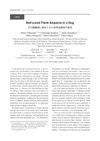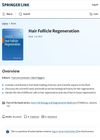 January 2012 in “The Japanese Journal of Veterinary Dermatology”
January 2012 in “The Japanese Journal of Veterinary Dermatology” The dog's hair loss healed on its own without treatment.
 192 citations,
June 1992 in “Journal of The American Academy of Dermatology”
192 citations,
June 1992 in “Journal of The American Academy of Dermatology” Hair loss can cause low self-esteem, anxiety, and depression in men.
 21 citations,
January 1988 in “Stress Medicine”
21 citations,
January 1988 in “Stress Medicine” Stress affects skin health and emotional well-being should be considered in skin disease treatment.
 222 citations,
October 1993 in “Journal of The American Academy of Dermatology”
222 citations,
October 1993 in “Journal of The American Academy of Dermatology” Hair loss affects women's mental health more than men's, causing anxiety, low self-esteem, and social insecurity.
 5 citations,
November 2021 in “Frontiers in Cell and Developmental Biology”
5 citations,
November 2021 in “Frontiers in Cell and Developmental Biology” Caffeine can damage hearing cells and affect hearing recovery after ear trauma.
18 citations,
August 2013 in “Journal of Feline Medicine and Surgery” Cats can get skin issues from things other than fleas, like insect bites, food, or allergens.
Human hair can almost fully recover its structure within about 1,000 minutes after being stretched.

New peptide biomaterials based on RADA16-I hydrogel can improve wound healing and could be used for tissue engineering.
 March 2024 in “CRC Press eBooks”
March 2024 in “CRC Press eBooks” Androgenetic alopecia causes hair loss, impacting self-esteem and confidence.
 January 2024 in “ACS Biomaterials Science & Engineering”
January 2024 in “ACS Biomaterials Science & Engineering” A new method using a microfluidic device can prepare hair follicle germs efficiently for potential use in hair loss treatments.
 180 citations,
September 1999 in “British Journal of Dermatology”
180 citations,
September 1999 in “British Journal of Dermatology” Hair loss affects self-esteem and quality of life; treatments can help.
 32 citations,
October 1999 in “Journal of women's health and gender-based medicine”
32 citations,
October 1999 in “Journal of women's health and gender-based medicine” Hair loss greatly affects women's mental health and appearance satisfaction.

Women with PCOS have lower self-esteem and body image satisfaction.
 2 citations,
September 2014 in “The American Journal of Cosmetic Surgery”
2 citations,
September 2014 in “The American Journal of Cosmetic Surgery” Stem cells could potentially rebuild missing structures in wounds, improving facial skin replacement techniques.
Oxidized hair can naturally regain strength and stability over six months.
 59 citations,
January 2015 in “Nanoscale”
59 citations,
January 2015 in “Nanoscale” The new micelle formulation delivers acne treatment more effectively and safely than current gels.
January 2020 in “International Journal of Research in Hospital and Clinical Pharmacy” Many pharmacy students self-medicate for dandruff, which is concerning and highlights the need for better education on treatment.
 90 citations,
March 2017 in “JAMA Internal Medicine”
90 citations,
March 2017 in “JAMA Internal Medicine” Men over 66 taking medication for prostate enlargement have a higher risk of depression and self-harm, especially in the first 18 months of treatment.
 7 citations,
January 2013 in “The journal of investigative dermatology/Journal of investigative dermatology”
7 citations,
January 2013 in “The journal of investigative dermatology/Journal of investigative dermatology” T-cell reconstitution after thymus transplantation can cause hair whitening and loss.
 126 citations,
April 2010 in “Seminars in Cancer Biology”
126 citations,
April 2010 in “Seminars in Cancer Biology” Deregulation of stem cell function is central to the development of some cancers.
51 citations,
March 2001 in “Clinics in dermatology” Bleaching damages hair, making it rougher and weaker.
 2 citations,
January 2022 in “Stem cell biology and regenerative medicine”
2 citations,
January 2022 in “Stem cell biology and regenerative medicine” The book "Hair Follicle Regeneration" discusses the potential of regenerating human hair follicles or activating dormant ones as a possible cure for baldness, and the promising role of new technologies like 3D printing in this field.
 5 citations,
December 2021 in “Frontiers in Cell and Developmental Biology”
5 citations,
December 2021 in “Frontiers in Cell and Developmental Biology” Enzymes called PADIs play a key role in hair growth and loss.
 September 2023 in “Drugs in context”
September 2023 in “Drugs in context” Baricitinib is a promising treatment for alopecia areata.
37 citations,
February 2010 in “Psychoneuroendocrinology” Androgen self-administration might be controlled by membrane receptors, not nuclear ones.
 8 citations,
October 2016 in “Experimental dermatology”
8 citations,
October 2016 in “Experimental dermatology” Hair follicles may help teach the immune system to tolerate new self-antigens, but this can sometimes cause hair loss.
1 citations,
August 1976 in “Veterinary clinics of North America” Cats often lose hair due to self-injury, usually from flea allergies.
 38 citations,
June 2016 in “Nanomedicine: Nanotechnology, Biology and Medicine”
38 citations,
June 2016 in “Nanomedicine: Nanotechnology, Biology and Medicine” Peptide hydrogel scaffolds help grow new hair follicles using stem cells.
 20 citations,
May 2015 in “Regenerative Medicine”
20 citations,
May 2015 in “Regenerative Medicine” The document warns against US clinics selling untested stem cell treatments without FDA approval.
 June 2024 in “Advanced functional materials”
June 2024 in “Advanced functional materials” A new wound dressing with electrical stimulation heals wounds quickly and without scars.























